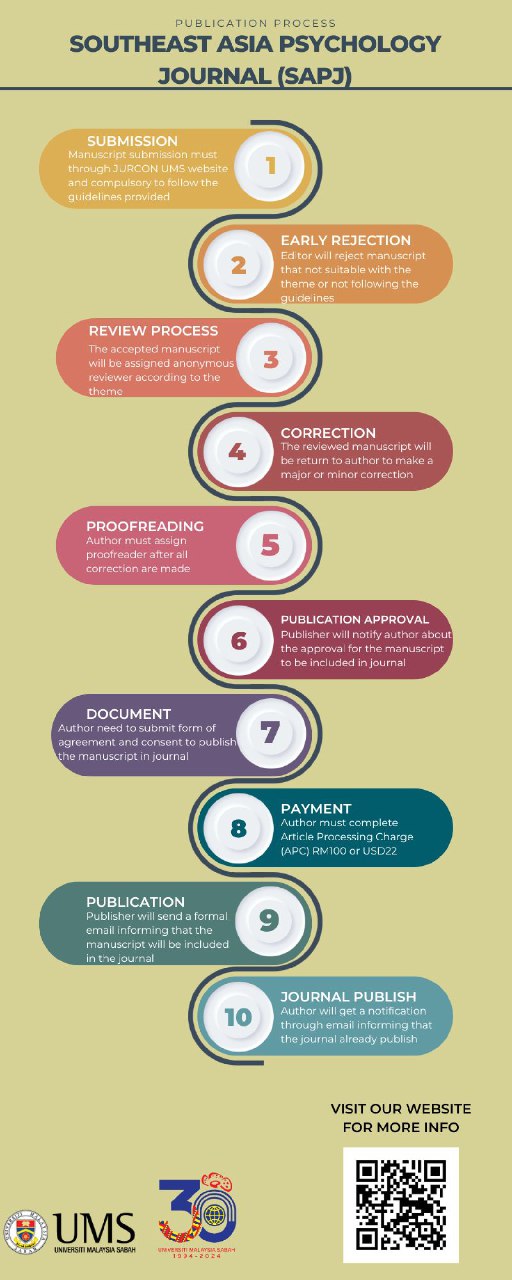KAUNSELING PENYALAHGUNAAN DADAH: CABARAN KAUNSELOR SEKOLAH MENENGAH DI BAHAGIAN KUCHING, SARAWAK
DOI:
https://doi.org/10.51200/sapj.v8i2.5134Keywords:
Challenge, Drug Abuse Counselling, Counsellor, High SchoolAbstract
This study aims to discover the challenges faced by high school counsellors who are confronted with the increasing number of students involved with drugs. Subsequently, this study investigates the difficulties faced by the counsellors, students' acceptance of counsellors and the barriers faced when conducting the counselling sessions. Qualitative studies have been conducted to answer these questions. Semi-structured interviews will be used to obtain relevant information and the focus of the study involves high school counsellors who have conducted drug abuse counselling sessions at least once and have served in Kuching, Sarawak. Seven participants were involved in this interview and 6 questions were asked namely i) the difficulties faced when conducting the sessions, ii) the
implementation procedures iii) students’ reactions iv) barriers from students v) counselling limitations vi) the manner of conducting the drug counselling sessions. The results of the study can help school counsellors to better understand and be prepared to deal with students involved with
drug abuse.
References
Brown, Eric C., Catalano, Richard, Fleming, Charles, Haggerty, Kevin, Abbott, Robert, Cortes, Rebecca, Park, Jisuk. (2005). “Mediator
Effects In The Social Development Model: An Examination Of Constituent Theories.” Criminal Behaviour and Mental Health 15:221–35.
Brown, S. A., Myers, M. G., Mott, M. A, & Vik, P. W. (1994). Correlates of Success Following Treatment for Adolecent Substance Abuse.
Applied and Preventive Psychology, 3(2), 61-73.
DiClemente, C. C. (1999). Motivation for change: Implications for substance abuse treatment. Psychological Science, 10(3), 209213.
Hadijah, Wan Shahrazad, Fauziah & Norulhuda. (2018). Faktor-Faktor Penyumbang Kecenderungan Situasi Berisiko Tinggi Dalam
Kalangan Penagih Dadah Berulang di Malaysia. Jurnal Psikologi Malaysia, 32(2), 1-11
Hong Kian Sam, George T.G.S., Gan S.L., Peter Songan, Abang Ekhsan A.O., Hasbee Hj. Usop, Mohd Razali Othman, Abang Ahmad
Ridzuan, Hatta Arabi & Shahren Ahmad Zaidi Adruce (2011). Faktor Sekolah, Sosio Demografi Keluarga, Gaya Keibubapaan dan Identiti Etnik Sebagai Peramal Penyalahgunaan Bahan: Kajian di Kalangan Pelajar Sekolah Menengah Sarawak. Jurnal Antidadah Malaysia. 8(2), 136-158.
Johari Talib. (2009). Profesionalisme Kaunselor Sekolah Rendah, MALIM Bil. 10 Koleksi Arkib Ucapan Ketua Eksekutif. (2003). Sambutan Hari Anti Dadah Kebangsaan. https://www.pmo.gov.my/ucapan/?m=p&p=paklahtpm&id=3273 [20 April 2020]
Ku Suhaila Ku Johari. (2015). Now To Future: Play Therapy Sebagai Satu Inovasi Untuk Kaunselor Sebagai Profesional Di Seting Sekolah.
Lasimon Matokrem. (2007). Intervensi Dan Peranan Kaunselor Untuk Menjana KepulihanKlien Sepanjang Hayat. Jurnal Anti Dadah
Malaysia, Jilid 1(1) 97-118.
Mahyuddin Arsat & Azizah Besar (2011). Penyalahgunaan Dadah Di Kalangan Murid Satu Kajian di Pusat Serenti Tang Dua, Melaka.
Journal of Science & Mathematics Education, 1-9.








